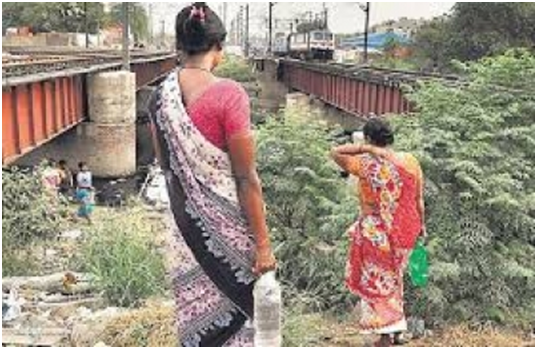Stinking Statistics of Open Defecation: Women Targets of Rape and Assault

NEW DELHI: Anyone who has ever parented a teenager knows the blazing embarrassment of not being able to provide their kids the right kind of clothes, the right school and the latest gadgets. But imagine for an instance that you're a 13-year-old girl who has no alternative but to defecate in an open field, in front of the prying eyes of random strangers and often potential assaulters.
While travelling to Kanpur, Uttar Pradesh, this writer met a 15 year old girl, Naina, who was selling earrings in her train compartment. She spoke about the harrowing lack of toilets in her village and how she and her mother Jyoti, along with a couple of her friends, went to defecate in the open fields every morning around 4, under the cape of darkness. On being asked why all the women in the village went together as a group, she said, it’s safer to go in groups since it counters the odds of being preyed upon to rape and harassment.
The threats are real: The ghastly rape and hanging of two teenage girls in the populous state of Uttar Pradesh last year, proves how women have become the biggest preys of the country’s sanitation predicament. The girls in this case had gone out to relieve themselves in the open after which were inhumanely gang raped and later lynched.
No country in the world, has more open defecation than in our very own India. 60% of the world’s open defecation happens in the country. The situation is poorer in the rural areas where, over 65% defecate in the open according to the WHO and UNICEF.
636 million of over a billion Indians are devoid of proper and clean toilets, according to the latest census data. This has contributed to a crisis that is replete with disease, childhood malnutrition, and loss of economic productivity due to early deaths. A recently highlighted crisis that has resulted due to open defecation is sexual harassment of women.
Women appear to swallow the impact as they are mostly molested and sexually assaulted when they step out of their homes early in the morning to relieve themselves. According to UNICEF, 50% of the rape cases which take place happen when women defecate in the open. Many other studies have shown that women who are denied access to proper toilets at home are more susceptible to sexual savagery at a time when they are travelling to and from public washrooms and open fields.
Open defecation has statistically reduced by 31% since 1990. However. More than 300 million women and girls in India still have no other alternative than to openly defecate. Trying to squat wearing a sari, holding a jar of water to wash yourself along with staying on their toes for lookout for rapists, is a task far-fetched and unimaginable for many of us urban citizens.
Researchers of a 2011 study, financially backed by WaterAid and DFID-funded Sanitation and Hygiene Applied Research for Equity collected anecdotal data about women residing in urban slums of Delhi who testified explicit incidents of underage girls being sexually assaulted while on their way to use a public toilet.
Open defecation is an issue which demands prompt attention because the potential hygiene catastrophe leads to not only forfeiture of dignity for women but also can make them prone to infections and ailments.
The government should take immediate steps to redress the problem so that women and men have access to suitable public health, which is a basic pre-requisite for a decent life.
Not just construction of toilets but the use of toilets has to be encouraged and endorsed. That would require a sweeping transformation in mindsets of people towards using toilets which can be done through powerful health communication programs and systems that help people cut across cultural barriers and recognize the importance of constructing and using toilets.
Millions of girls like Naina have a right to basic and proper sanitation conveniences so that they don’t have to compromise on their self-respect for a practice as natural as squatting.
"Toilets first, Temples later" was a key highlight of Prime Minister Narendra Modi’s grand manifesto. He and his party need to fulfil the promise soon for a better, healthier and a cleaner India, a country that can keep its women safe.



